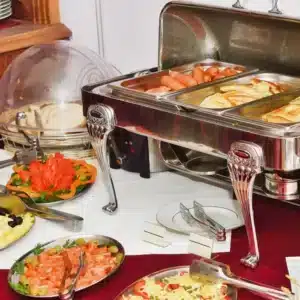I always knew Clara would turn her wedding into a performance. She’s the kind of person who treats brunch like a competitive sport and thinks gift-giving is only meaningful if the brand logo is visible from space.
But even I didn’t expect her to charge admission.
The text arrived exactly one week before the wedding. Short. Sharp. Soaked in entitlement.
“Hi Nina! Just a reminder, everyone’s expected to bring $500 cash to the wedding. No exceptions! We’re putting it toward our new house. Thanks! – Clara”
I stared at my phone, blinking. Surely this was a joke.
Five. Hundred. Dollars?
As if the plane ticket, hotel, time off work, new dress, and shoes hadn’t already drained my budget.
And what really got me? The word “reminder.” There had never been a mention of this before. She wrote it like I’d missed a memo. Like I’d forgotten to pay a bill I’d never received.
The part that stung most? I’d already planned her gift months in advance. A custom art piece — names, date, and birthstones — from a local artist Clara once gushed over during brunch. It was elegant. Personal. The kind of thing that lives on someone’s hallway wall for decades.
But now, apparently, that wasn’t enough.
I tried to be calm. I opened the fridge, grabbed a juice, and typed.
“Hey Clara, I actually already have a really thoughtful gift I was excited to give you guys. I can’t manage $500 on top of the travel costs. Hope that’s okay?”
I pressed send. Then tried to distract myself with dinner.
Her reply came back immediately — like she’d been waiting to pounce.
“Umm… not really, Nina. We made it clear. Everyone’s giving the same. It’s not fair if some people get to be cheap. That’s just how we’re doing it. Sorry.”
Cheap.
That word sat on my chest like a stone.
I reached out to mutual friends — Sonia, Danika, Michael — to see if this was real. One by one, they confirmed what I feared.
“She didn’t ask me for anything.”
“I mailed her a gift basket weeks ago…”“Wait. $500?! You’re kidding, right?”
That’s when it hit me. Clara had made her own mental guest list — a tiered system based on who she thought could afford to “contribute more.” And with my recent promotion, I’d apparently made the “premium” tier.
Not a guest. A target.
Still, I went to the wedding. Not for her — for myself. I needed to see this circus through. Needed the closure.
The vineyard venue looked like it had been plucked from a Pinterest board — peonies in gold vases, string lights stretched like constellations above the lawn, staff gliding through like silent spirits in tailored cream.
At the welcome table, a smiling hostess greeted me.
“Name, please?”
“Nina,”
I replied.
Her smile faltered. She flipped through her clipboard, then looked up.
“Do you have the envelope?”
“What envelope?”
“The envelope with the cash gift. The bride has you listed on the premium guest list.”
“I brought a wrapped gift,” I said, stunned.
She straightened, voice clipped now.
“Then I’m sorry. Clara’s instructions are clear. No entry without the envelope.”
I stood there, frozen. Fury simmering under my skin.
And then, like a storm sweeping in from the horizon, came Aunt Elise — Clara’s mother — elegant in lavender, her voice a velvet blade.
“Nina, darling, is there a problem?”
I handed her the clipboard.
“Did you know your daughter is charging guests for entry? That she put some of us on a list?”
Her face shifted — calm snapped away like a candle extinguished mid-prayer. She said nothing. Just turned and walked inside with the energy of a woman who had reached her last straw.
I followed.
The music stopped.
Aunt Elise took the mic.
“Before the ceremony begins, I’d like to say a few words about my daughter.”
Wine glasses paused mid-sip. The guests froze.
“To Clara — who has decided that love is only valuable if it’s attached to cash. To my daughter, who invited guests only to charge them for the privilege of attending.”
Gasps rippled like thunder. Clara, glowing in lace, stood near the archway, bouquet clenched like a lifeline.
“Did any of you know she created a ‘premium guest list’?”
Aunt Elise held the clipboard high.
“Some of you were asked for hundreds in cash. Not with grace. Not with kindness. With expectation.”
A cousin stood and silently retrieved her envelope from the gift table. Others followed — some casting glances, some shaking their heads. The room was falling apart before the vows had even been exchanged.
And then came the final blow.
“If you value money more than people, Clara, you end up with neither.”
Aunt Elise dropped the clipboard, torn in half, to the ground.
The ceremony continued, technically. But it wasn’t a celebration anymore. It was a performance no one believed in. Mason looked at Clara like a man seeing someone for the first time — and not liking what he saw.
I left before dessert. Took a few chocolate tarts for the road. No one stopped me.
At the edge of the lawn, I glanced back. Clara stood alone near the arch, her bouquet unraveling in her hands. She looked lost. Small. A bride with no one left to blame but herself.
A week later, she emailed me.
“You could’ve spoken to me directly instead of involving my mom. She humiliated me. I thought you supported me. Guess I was wrong.”
There was no apology. Just passive-aggression, selective memory, and a complete refusal to see the harm she caused.
I never replied.
Months passed. The wedding photos appeared online — carefully posed, filtered, perfect. You’d never know what really happened under those fairy lights.
Last I heard, they didn’t get the house. Moved into a small apartment outside the city. The dream built on guilt never quite got off the ground.
The art piece I made for Clara? Still wrapped, still in my closet. Navy and gold, their names surrounded by birthstones blooming like stars. It was made with love.
But love isn’t a transaction.
And family isn’t a price tag.
Some weddings end in cake and confetti.
Others end in silence, torn guest lists, and a mic drop from the mother of the bride.
This one ended with a lesson:
You can budget for a wedding.
But you cannot invoice love.





